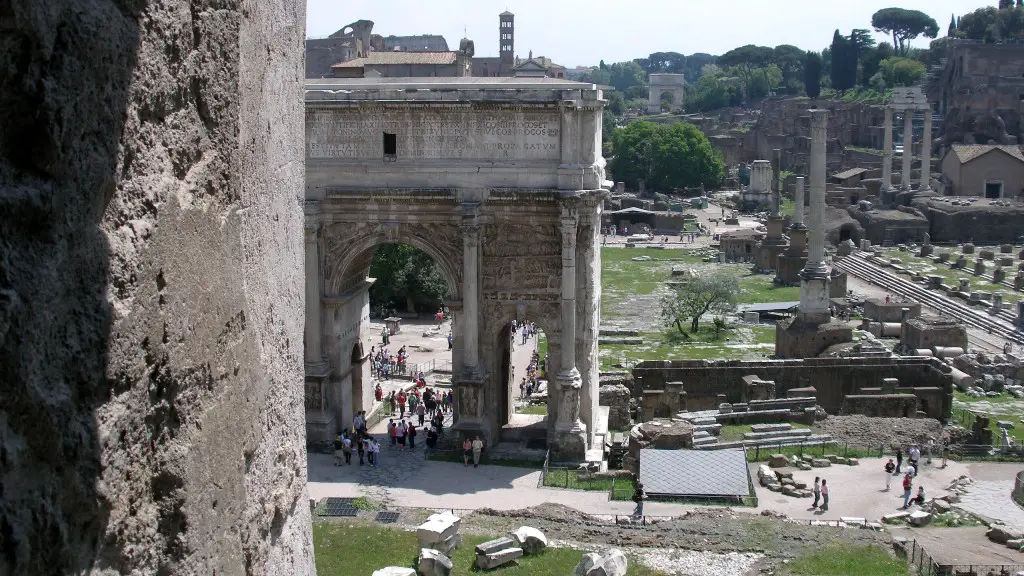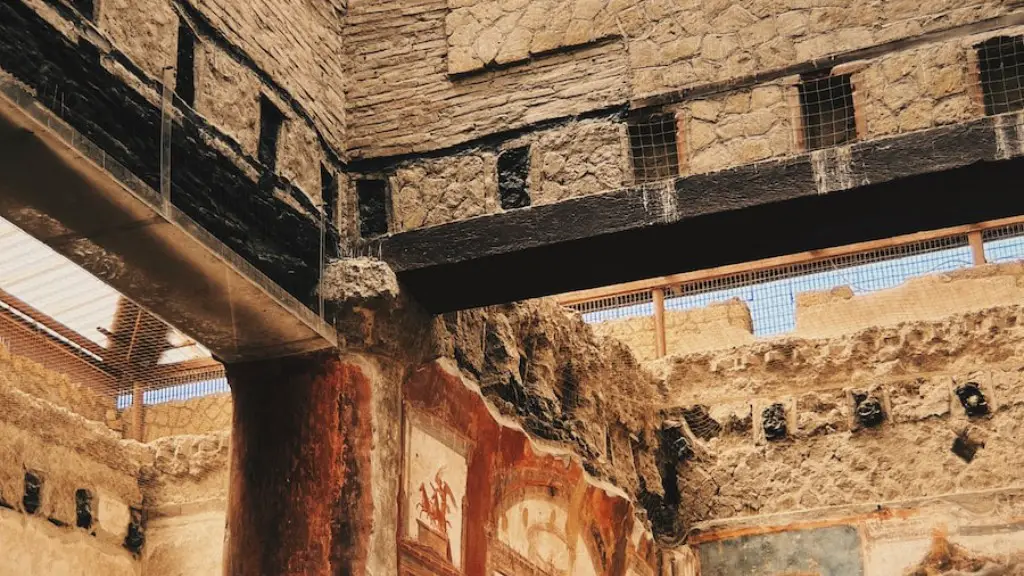Murder was not an uncommon phenomenon in Ancient Rome. This can be seen in history books which often contain tales of bloodshed and violence. It appears that the murder rate in Rome was quite high for the time, with murder cases often being heard in the courts. According to historians, murder was a matter of public concern, and the law was used to bring many perpetrators to justice.
Ancient Rome had a long history of violence and aggression, and it seems that murder was a particularly common way to take out one’s enemies or rivals. In fact, this was the source of many of the conflicts that were fought in the Roman Republic. Historians have suggested that many of these murders were politically motivated, with individuals being targeted for political gain.
While it is hard to quantify the exact number of murders in Ancient Rome, historians estimate that the murder rate was likely quite high. Ancient Rome was a large city, with a population that was estimated to be around one million. Over the course of its history, there were numerous assassinations, executions and stabbings, all of which contributed to the murder rate in the Rome.
The courts in Ancient Rome took a hard line when it came to punishing those accused of murder. Those who committed murder could expect to face severe punishments, ranging from exile to death. This was done to dissuade individuals from committing murder and to uphold the rule of law. Additionally, the death penalty was often used against those who killed their own family members.
The murder rate in Ancient Rome was likely high compared to other cities of the time. However, this was likely due to the high rate of political unrest and conflict in the Republic. It is therefore likely that the murder rate was in line with the wider situation in Rome.
In addition to homicide, Ancient Rome also had a problem with gang violence. This was particularly common in the poorer areas of the city and could often result in innocent bystanders being killed. This was only made worse by the lack of clear boundaries between different parts of the city and the lack of a reliable police force.
Despite the high rate of murder in Ancient Rome, the Roman Republic was extremely successful in many aspects of their society. This included the legal system which allowed for a functioning State and a fair justice system. This means that the high murder rate in Rome was likely a result of social and political unrest and had little to do with the functioning of the justice system itself.
Causes of Murder Rate In Rome
The primary cause of the high murder rate in Ancient Rome was thought to be political unrest. The Roman Republic was a major power in the Mediterranean and was engaged in many conflicts throughout its history. This often led to rival factions vying for power, leading to a high degree of violence. In addition, this violence was exacerbated by the lack of a reliable police force, making it hard to control criminal activity.
Furthermore, Ancient Rome was home to many different social classes, which led to a high degree of economic inequality. This inequality often led to individuals using violence to get ahead in life, resulting in an increased murder rate. Additionally, the death penalty was common in Ancient Rome and could be used to take out rivals and enemies.
Historians have also suggested that poverty and the lack of education in Ancient Rome could have contributed to the high rate of murder. With civil unrest and poverty so prevalent, it was easy for those who wanted to settle scores to commit murder. Additionally, many of the poorer classes were not taught about the legal system and thus could not access justice for wrongs done to them.
The Effect of the Roman Justice System
The Roman justice system was a major factor in the high murder rate. The level of punishment was often harsh, with the death penalty being used in many cases. This extreme level of punishment was likely used to send a clear signal that violence was not tolerated in the Republic. In addition, the court system was used to settle civil disputes and to bring justice to those who had been wronged. This suggests that the Roman justice system was largely successful in controlling crime.
Additionally, the Roman justice system also allowed for the victim to take a case against those who had wronged them. This meant that individuals had the chance to seek redress for wrongs done to them, which had the potential to lower the murder rate. However, this was likely limited by the lack of reliable police force and the extreme punishments that could be handed down.
Furthermore, the law in Ancient Rome was quite strict and was heavily influenced by religion. This meant that individuals were expected to respect the law and could face severe punishments if they disobeyed it. This had the potential to lead to a reduction in criminal activity and to ultimately reduce the murder rate.
Social Factors Contributing to Murder Rate in Rome
Social factors were also thought to have played a major role in the high murder rate in Ancient Rome. Historians have suggested that due to the extreme poverty, many individuals saw murder as a way to get ahead in life. Additionally, the lack of education meant that many individuals were not aware of the legal system, thus unable to use it as a way to demand justice.
Moreover, a major factor that is thought to have contributed to the high murder rate was the prevalence of gangs. Gangs were common in Ancient Rome, and many gangs had members who were willing to commit murder for financial gain or for revenge. This often led to innocent bystanders getting harmed, resulting in a higher murder rate.
Lastly, some historians have suggested that the presence of slavery could have contributed to the high murder rate. Slaves were seen as property and had little to no legal rights. As a result, it was easy for owners to take out their frustrations on slaves, and many of them were murdered as a result. This may have contributed to the high murder rate in Rome.
Consequences of the High Murder Rate in Rome
The high murder rate in Rome had a number of consequences for the City and its people. Firstly, it meant that many innocent lives were lost. This in turn had an effect on public morale, as few felt safe in a place with such a high crime rate.
In addition, the high murder rate also had an effect on the economy. Businesses suffered due to a lack of customers and investors, as the risk of crime was a major deterrent. This in turn led to a decrease in wealth, as money was not being invested into social and economic projects.
Furthermore, the legal system was challenged by the high murder rate. Many criminals were convicted of committing crimes that may not have been as serious as murder, thus resulting in an overcrowding of the prisons. This in turn meant that those convicted of actual murder may have received lesser sentences than they should have, as resources were being stretched.
In addition, the high murder rate in Ancient Rome likely caused further social unrest. With so many disputes being settled with violence, the Roman Republic was increasingly destabilized. This ultimately led to its eventual demise and the collapse of the Republic.
Significance of the Murder Rate in Ancient Rome
The high murder rate in Ancient Rome is significant for a number of reasons. Firstly, it is a reminder of the extreme violence that was a part of the Roman Republic. This violence ultimately led to the downfall of the Republic, as its people could not be kept safe from such extreme acts of crime.
Additionally, the high murder rate in Ancient Rome is symbolic of the extreme poverty and inequality that many of its citizens faced. This inequality led many to take out their frustrations on their fellow citizens, resulting in a high rate of murder. This in turn made the Roman Republic even more unstable and contributed to its eventual downfall.
Lastly, the high murder rate in Ancient Rome serves as a reminder of the importance of having a functioning justice system. Without a reliable police force and fair punishments, individuals would have no incentive to respect each other’s rights and would be more likely to turn to violence as a way of settling disputes. This demonstrates the importance of having a functioning legal system in order to maintain a civil society.





